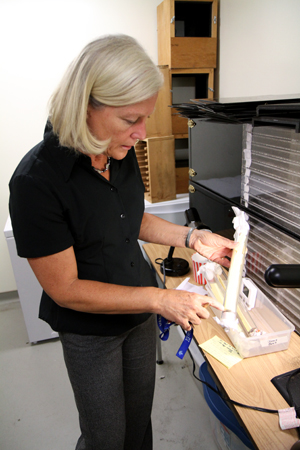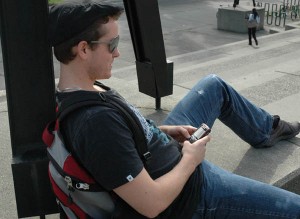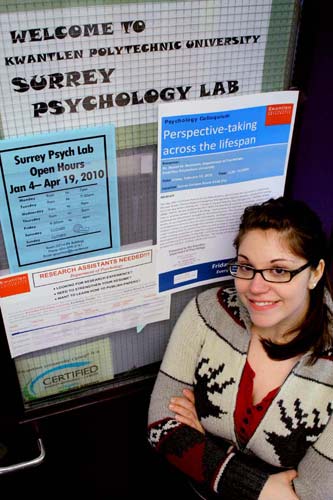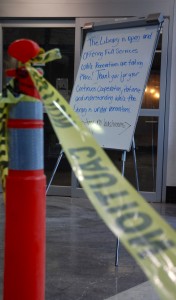Kwantlen student union building still at talking stage
October 4, 2010 by Brian Russell · Leave a Comment
The Kwantlen Student Association’s planned student union building (SUB) at Kwantlen’s Surrey campus, fees for which were passed in a KSA referendum last September, is still being discussed by the KSA and the university.
Although it has been a year since the referendum, talks are still on as to what role Kwantlen will play in the creation of the SUB.
“Following that successful [referendum], the university formed a joint working group with the KSA to discuss this initiative. The university is considering a joint project with the KSA for this building,” said Jody Gordon, associate vice-president, students.
The SUB would likely be home to student-oriented services run by the KSA and other services that would appeal to students. However, exactly what all of these services, or possibly programs, will be, hasn’t been determined.
“[Kwantlen and the KSA] are currently reviewing the type of programming that they would like to see in the building. At this stage neither party has finalized that programming,” said Gordon.
Though this may sound worrying to students who had to pay a little more for their school fees this year, an end to the discussion and a beginning to the construction is in sight.
“Over the next two months it is our hope that we will come to a joint resolution on the location, the size of the building and the applicable programming,” said Gordon.
Video: Kwantlen students paying more to park
September 25, 2010 by Josh Saggau · 1 Comment
Translink’s parking tax increase has raised the price students have to pay to park at Kwantlen campuses. Josh Saggau and Hayley Woodin explain what it means for students and talk to students to see how it’s affecting them.
Extreme Makeover: Kwantlen library edition
September 25, 2010 by Jocelyn Gollner · Leave a Comment
The library at the Kwantlen Richmond campus is getting an overhaul, undergoing a $1.2-million reconstruction project, partially funded by the Knowledge Infrastructure Project (KIP).
(KIP is part of Canada’s Economic Action Plan, and will spend $2 billion over two years to repair and expand colleges and universities across the country. In B.C., KIP is spending more than $230 million on 44 post-secondary institutions.)
Some of the improvements to the Kwantlen Richmond library will include more computer stations, more seating, more study rooms, a new copy room and a new information desk.
“I just think it will be an amazing transformation,” said Cathy MacDonald, the University librarian. “It will just be much more updated.”
The library at the Kwantlen Richmond campus is one of three projects at Kwantlen Polytechnic University partially funded by KIP. The other two projects are various student services renovations at the Langley campus and a partial building replacement at the Surrey campus.
The Kwantlen Richmond library is still open during renovations, but if you are looking for a quiet place to study, don’t go in the morning.
“[The contractors] are going to try to do much of the noisy drilling before 8 a.m.,” MacDonald said.
As well, the washrooms are not available for use in the library.
The renovation project is expected to be finished before the end of December.
“We had a report today that they are right on schedule,” MacDonald said.
More details about the library reconstruction are available at the college website.
Note: This article was updated, with quotes from Cathy MacDonald, on Sept. 30, 2010.
September 25, 2010 by Jeffrey Yip · Leave a Comment Dr. Deborah Henderson showing how trichogramma sibericum, a tiny parasitic wasp, is produced at the Institute for Sustainable Horticulture's research lab. The wasp is used to help control fireworms, an insect pest that attacks cranberries. (Photo by Jeffrey Yip) While it still hasn’t put its sign up, the Institute for Sustainable Horticulture lab, or ISH lab, is now up and running. “I’m glad you came a year after opening … because when it opened we had an empty lab,” Dr. Deborah Henderson said. Henderson has a PhD in entomology from UBC and a post doctorate in medical entomology from the University of Toronto. Before coming to Kwantlen, she had her own company, ES Crop Consulting Limited, a consulting company in agriculture that provided integrated pest management, monitoring services for farmers, and research and field trials in biological control products. “It took far longer than I had ever thought to get it up and moving. But, we’re pretty functional now.” While the ISH lab isn’t a teaching facility, its research project are very much integrated with Kwantlen’s School of Horticulture and the Environmental Protection Technology (EPT) program. And one of the most important collaborations that the ISH lab has with the two programs is a project in Cuba. Six students headed for Cuban farms “There’s a food security project in Cuba and a number of field research trials going on there,” Henderson said. “So, we have six student going to Cuba at the end of October to spend three months working on bio control field trials on a cooperative farm. Two of them are EPT students and four of them are horticulture students.” Henderson hopes to continue this project over the next three years. “[W]e want to make it a regular program with Cuba, and integrate it into the new degrees that are in the School of Horticulture. So there could very well be in the future, a course that’s offered in Cuba in the winter term. The students would go down and take that course in Cuba and get credit here,” Henderson said. According to Henderson, Cuba is the world leader in the use of biological controls, that is using fungi, viruses and other insects to control crop damaging insects. When the Soviet Union collapsed in the early 1990s Cuba lost nearly 90 per cent of its imports, including food and petroleum products. As the country began to starve, the government enlisted the country’s farmers to find a solution to the food shortages. There answer was to turn much of the available space in the cities into organic vegetable gardens. Because the gardens were in the cities, the food was organically grown, with no chemical pesticides. Instead they used bio controls. “They’re still using chemicals for some production out in the country,” Henderson said. “So, the project that we’re working on is the conversion of large cooperative farms to ecological methods. And the students are going to be involved in that. [W]e have a 600-hectare farm that has agreed to convert to these ecological methods.” Working closer to home
Closer to home, the ISH lab is also conducting research with biological controls. The biological controls the ISH lab works on are a naturally occurring part of the ecosystem. The lab isolates them, makes more of them and tests them to see how effective they are in controlling insects that damage food crops. But, unlike other labs, Henderson wants their research to go one step further and take successful bio control products all the way to commercialization. “We’ve got to get products in the hands of growers or else our research isn’t benefiting the people that need the research done,” Henderson said. A major part of the lab’s work with bio controls has to do with horticultural sustainability. For the ISH lab, achieving sustainability will also focus on how climate change will affect food production, and looking into new production systems that are closer to market will reduce the use of fossil fuels to bring products from far away. “We are very unsustainable as a species. We have to become sustainable. So any time we can replace unsustainable practices we’re a step towards that goal. And so my particular expertise and experience is doing exactly that,” Henderson said. “[W]e are going to have to face the reality of climate change. We have a responsibility to take care of our own food security. How can we help anybody else when we can’t feed of ourselves. And right now we don’t feed of ourselves.” British Columbians ‘want sustainable food production’ According to Henderson, only four per cent of B.C.’s land is arable, that is land that can be used for growing crops. But, Henderson believes British Columbians are sensitive to food security issues and want food production to be sustainable. “I think we are in great shape. [W]e grow close to 250 crops in B.C. already. So, in that sense we have a pretty big advantage over the Prairies for instance,” Henderson said. “Quite honestly I think there’s a big social benefit to growing your own food close to home and knowing where your food comes from … and not being so divorced from it that you think it comes from a grocery store.” As part of being sustainable, the lab itself is doing its part. “It’s a beautiful facility. It’s been made to be as energy efficient as possible. We’ve applied for LEED certification on it, that’s a designation for environmentally friendly buildings,” Henderson said. The lab has two sides: microbiology, where they do the research on fungi, and entomology, where they do research with insects and insect viruses. The lab also has production facilities for making fungi and rearing predator and parasitoid insects. Overall, Henderson seems pleased with the progress the lab has made over the past year, especially in its collaboration with Kwantlen’s horticulture and EPT programs. “The kind of things we do now with students, I’ve written internships into all of our research proposals,” said Henderson. “So many of our programs are applied focused … so our research is [also] applied focused. And they enhance each other.” “We’ve got a little turf project where we’re going to look at compost on turf and so I’m going to communicate with the turf instructors to say, ‘Would you like to get your students involved? Here’s what I have in mind. Do you have any better ideas?’ And we’ll do it with them so that students can be involved.” September 19, 2010 by Jeff Groat · Leave a Comment Unlike students at Surrey and Langley campuses, students at Richmond campus already have fast transit access with the Canada Line stopping at Lansdowne station. (Photo by Jeff Groat) The B.C. government has granted smaller universities access to the U-Pass program, but for students at Kwantlen, implementation is easier said than done. The U-Pass is a subsidized bus pass program, allowing holders multi-zone access to Metro Vancouver’s bus and SkyTrain system. For larger universities, like UBC and SFU, who are served well by Translink, Kwantlen’s campuses in the suburbs are faced with challenges that may affect how many people would actually find such a pass useful. “This is a real challenge for, in particular, Surrey, Langley and Cloverdale students,” said Jody Gordon, Associate Vice President, Students at Kwantlen. “[TransLink say[s] there’s no money to put on the table for service improvements, unlike past U-Pass programs,” she said. Gordon cited UBC negotiating for extra B-line service as something that Kwantlen won’t see. This means a traditional U-Pass for Kwantlen that is merely a cheap bus pass doesn’t have the same value as it would at other universities. According to Matt Todd, KSA Director of External Affairs, a typical bus pass needs to be coupled with a variety of other services in order to make it appealing to students who now drive to school, a number that is quite large at Kwantlen. “There isn’t very good transit in some neighbourhoods, in what we call the south-of-Fraser region,” Todd said. “This is a challenge for Kwantlen students, because some of them, public transit is not a reasonable option for them.” A more direct challenge facing Kwantlen is increasing the transit service between campuses by creating an express Kwantlen route between Richmond, Surrey and Langley campuses. Such an option would need to be financed by Kwantlen at the outsest, according to Todd. Based on what it sees as the transit shortfalls, the KSA wants to move beyond the U-Pass into what it’s calling a multipass, marrying the normal transit pass with other services that students may want. “The U-Pass is about healthier living and sustainable living,” Todd said, citing a reason to opt for including such items as a discounted gym membership in the pass. “Of course, not everybody is going to want to be a Gold’s Gym member, so what else can we do?” Todd asked. Another option would be to offer students who drive a discount on parking passes, making sure everyone has something they could take advantage of with a Kwantlen-style U-Pass. Gordon said that identifying which students would qualify for a multipass would not be easy. As some programs do not run on a regular semester-based system, some students who would find a use for the pass could go without one under the current definition. The total cost of a multipass, with all of its extra services, would come in at about $40 according to the KSA, and would likely not be available until fall 2011, although it may be available as early as summer semester next year. • • • Amanda Punshon takes a look back at the history of the popular low-cost transit pass: click on each of the “bus stop” years to see how it has all unfolded. September 18, 2010 by Meagan Gill · Leave a Comment Greg Spoorski uses his BlackBerry to check his Facebook messages while on a break from class on Sept. 16. (Photo by Meagan Gill) Social networking sites such as Facebook and Twitter may seem like a major distraction from doing homework, or anything productive for that matter, but are they really a waste of time? As well as spending time on Facebook poking people, commenting on friends’ new relationships and creeping random profiles, there are some ways Facebook can be used productively. “If you can’t reach someone on the phone, you know they will be on Facebook. It’s helpful because you have a way of getting in contact with them if you missed a class and need their notes,” said Matthew Espinosa. Some Facebook groups can be beneficial to studies. “Everyone is using Facebook now. The people in my class want to start a new group where we can share ideas and keep in touch with each other,” said Brittany Bird. Facebook has a group for Kwantlen Polytechnic University that lets students connect and post events happening on campus. “I find Facebook very helpful with keeping in touch with friends, being able to buy/sell used textbooks and join study groups,” said Joe Che. Facebook also has groups for the different programs offered at Kwantlen Polytechnic University. “The Official Kwantlen Page” is an example of one group that allows past and current students of the fashion program to get together, share ideas, plan events and post pictures of their creations. “I find it very helpful to use social networking, especially Facebook and Twitter, as a marketing medium for my online business,” said Greg Spoorski. Twitter is also a popular choice when it comes to social networking and an effective way to connect with people in 140 characters or less. “I find Twitter incredibly helpful because of the speed it generates information at. I can find out what everyone is doing and things that are happening all around the world, ” said Anna Burchill. September 17, 2010 by Brittany Tiplady · Leave a Comment Kwantlen students are no longer able to pay domestic student registration fees and tuition with credit cards. That may been old news, as the change was announced on July 14 and came into effect on Aug. 3, but the effect the new policy had on Kwantlen students isn’t. According to the university website, “The change is aimed at reducing operational costs without cutting services or programs for students. In fact, $250,000 expected from the savings will be put towards additional scholarships and bursaries for students this year.” But the inconvenience of the payment change has increased the number of annoyed Kwantlen students. “I was super last minute paying my tuition, and I had no idea we couldn’t pay with credit cards anymore, so my dad and I had to rush to the bank to pay cash at the campus before it closed,” said Florencia Caula, a second-year Fashion marketing student. “I guess it was my fault for not having checked, but it also threw me off that Kwantlen didn’t accept certain debit cards any more, either. The point is, people rarely have cash to pay tuition; we’re students,” she said. Lisa Niskasari, also a Fashion marketing student had the same experience. “I heard about the credit card change on the news, but I didn’t know they weren’t allowing credit union’s either. So I had to do the same thing as Florencia and pay with a cheque at the registrar, on the cusp of the registration deadline. “I get that they want to put the money towards scholarship and bursary, but honestly I wouldn’t have known that had I not looked into it after I nearly lost my spot this semester. Thankfully I can still use credit for books,” Caula said. According to Robert Hensley from the Kwantlen registrar’s office, the payment change did not have a negative impact on fall registration; in fact registration numbers were up 3.3 per cent. “We only had a small number of formal complaints from students about the payment change,” said Hensley. “The only change was an increase of students paying with debit and cheque.” April 18, 2010 by Kirk Darbyshire · Leave a Comment It was a harsh math lesson this week for a Kwantlen student, whose bid to have his driving suspension reduced was denied by a B.C. Supreme Court. Ali Maasoumian had his driver’s licence suspended for eight months by the Superintendent of Motor Vehicles after he accumulated 17 points by the end of 2008. Prior to the start of that suspension, the superintendent noted that he had accumulated another eight points in a nine-week span and so extended the ban by six months.
Maasoumian requested a review of his second suspension because of the hardships not having a driver’s licence placed on him. These hardships include not being able to drive to North Vancouver where he takes care of his father’s property and increasing his commute to school from a 25-minute drive to an hour-and-a-half commute on public transit. “I am satisfied that the hardship which is put forward is not a hardship that I should take into account,” wrote Justice Grant Burnyeat. “Having a driver’s license and being able to operate a vehicle is not a right. Rather, it is a privilege.” March 8, 2010 by Mitch Thompson · Leave a Comment Hayley Leveque, a fourth-year psychology student, stands at the entrance to the room where she interviews her subjects. Leveque said her field of study, sexual psychology, is uncommon due to its taboo nature. (Mitch Thompson photo) Hayley Leveque wants to talk to you about sex. A fourth-year psychology student, Leveque is in her final semester of the honours program, which requires students to develop and run a research experiment. For her project, Leveque is polling couples between the ages of 18 and 25, and those over 30, on their relationships, and seeing how the two compare. Her inspiration came from her friends and the various issues in their relationships. “I was getting anecdotes and stories from friends where they were having difficulty staying together or figuring out the status of their relationships,” she said. Some friends had also started experimenting with casual sex, and it got Leveque wondering why all these issues were occurring at these ages. Her research is centred around the work of psychologist Jeffery Arnett, who, in 2000, wrote an article on a phase of life he labelled “emerging adulthood.” Young people from 18 to 25, Arnett theorized, are free of the rules and regulations that held them in adolescence but have not yet reached the point where they have taken on the responsibilities of adulthood, such as careers or children. During this time, emerging adults spend a lot of time thinking about the direction their lives will take, an extended period of self-discovery. But Leveque hasn’t found a lot of research on the sexual relationships of this age group and how they differ from older people. “If we can get a glance at some of the normative sexual behaviours of emerging adults as a group, we can start to figure out why these things are happening,” she said. She hopes that her research will uncover the motivations behind young people’s relationships, the reasons why they are having sex. She sees her work as creating a better understanding about the nature of young adult relationships in general, a knowledge that Leveque feels could assist services such as couples counselling. Leveque is still early on in her study, collecting interview subjects and compiling data. After that, she’ll analyze the data to see what makes emerging adults tick. She can’t say what her hypothesis is or how many people have signed up (for fear of tainting the interview pool) but she did say that she’s looking for more people, especially those couples who are 30 or older, to talk about sex with her. “Older adults are definitely harder to collect. They have kids to take care of and longer work hours,” she said. Anyone interested in participating in the study can contact Hayley Leveque at 604-315-3931 or via email her. February 11, 2010 by mark · Leave a Comment First-year journalism students are covering the Olympic Torch Run, as it moves through Vancouver today (Thursday). This is the first of what will be several slideshows showing the run and the students’ work. Kwantlen’s ISH lab finds a second home in Cuba

U-Pass for Kwantlen appears easier said than done

“Langley, Surrey, Delta, those communities don’t have the quality of service that other cities in the Metro Vancouver area have.U-Pass: A timeline
Students finding ways to put social media to work

Credit card change inconveniences students
Kwantlen student’s appeal supremely dismissed
Leveque’s talk about sex

The Olympic Torch run in photos



